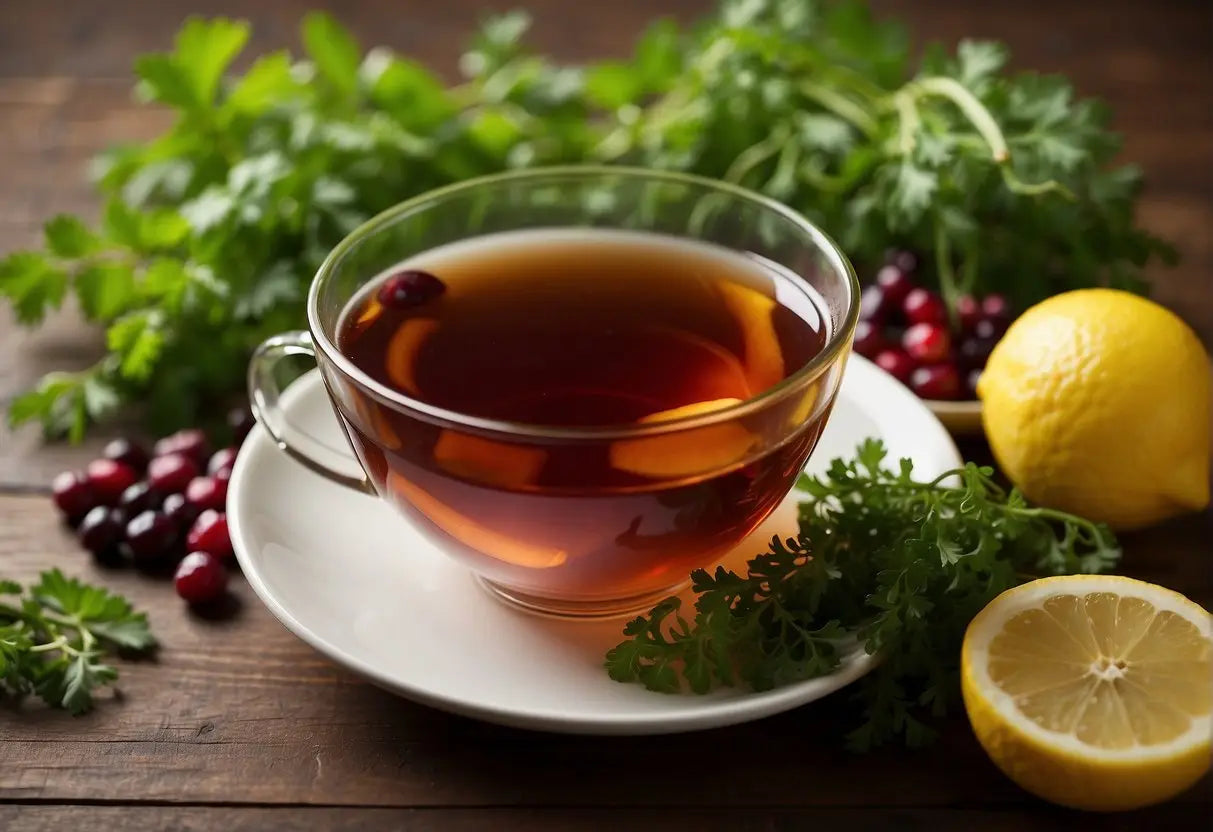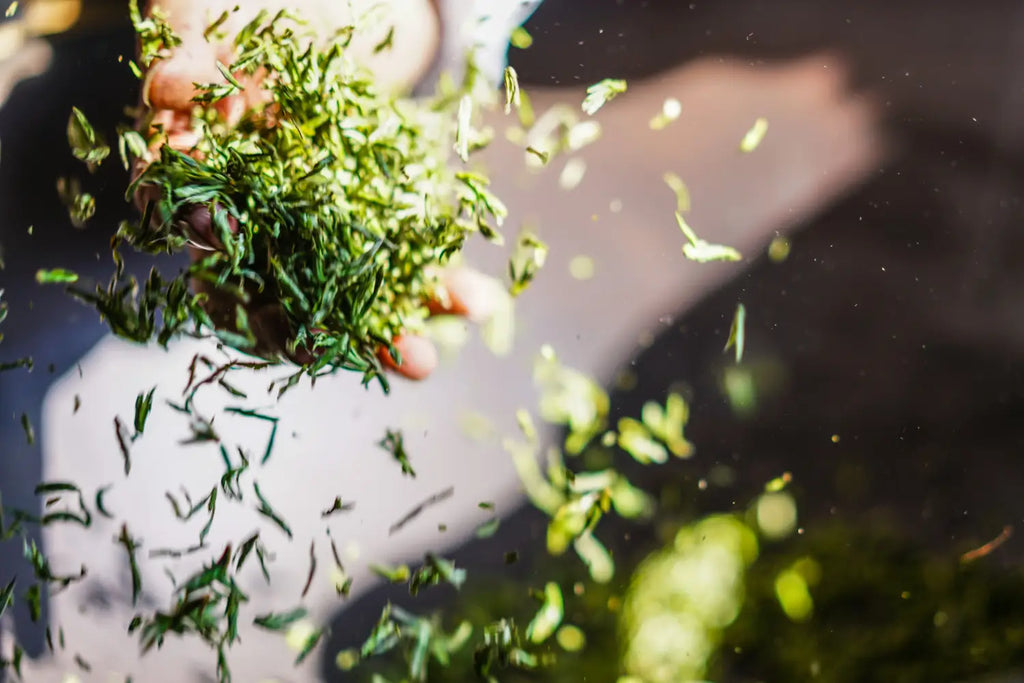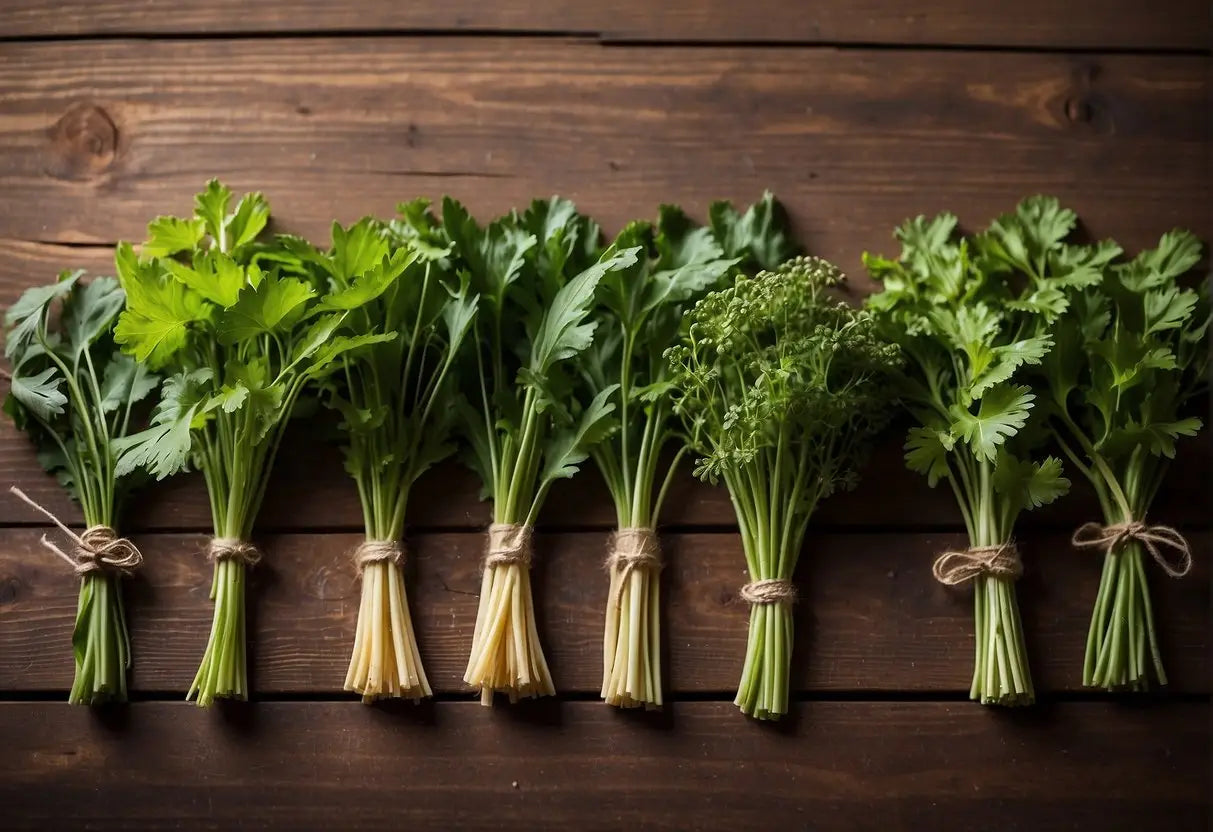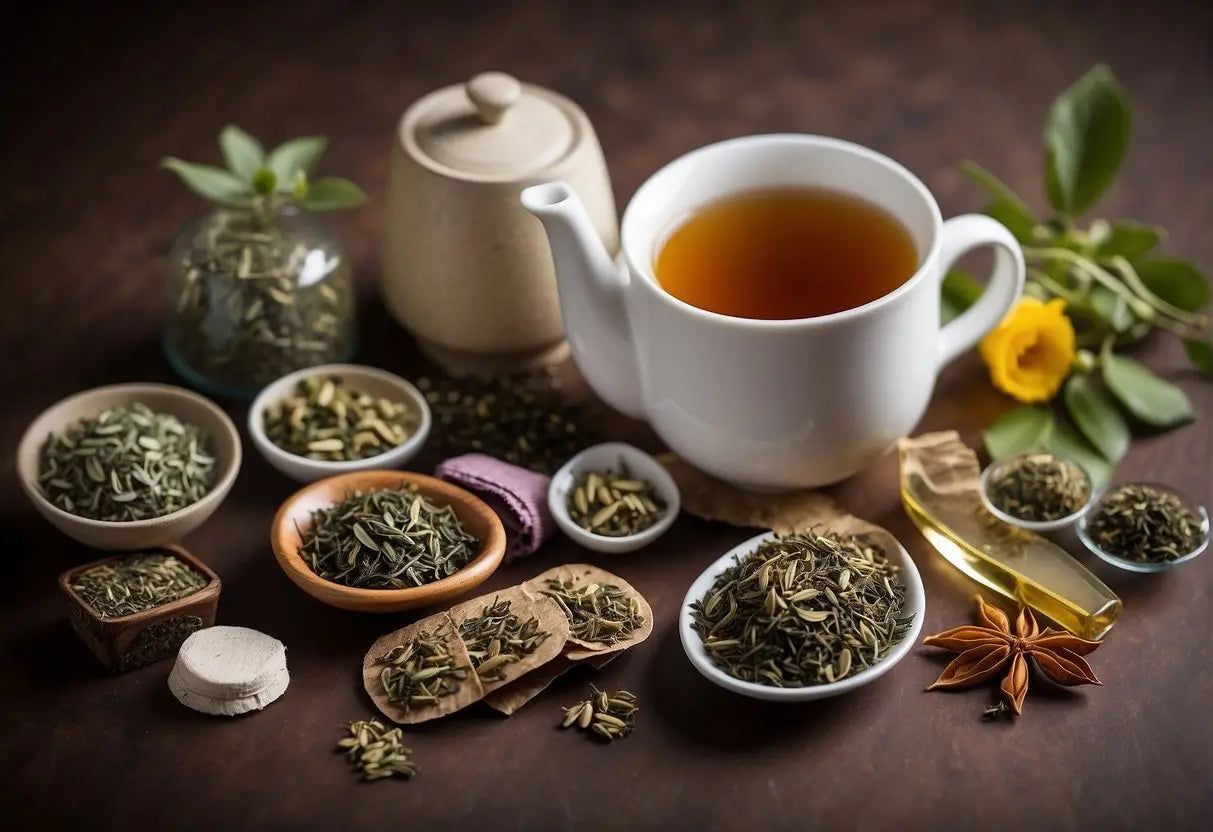What Tea is Good for Kidney Cleanse
Your kidneys are vital organs that play a crucial role in your overall health. They are responsible for filtering waste products from your blood and excreting them through your urine. Here's a brief overview of their function:
-
Filtration: Every day, your kidneys filter about 120-150 quarts of blood to produce about 1-2 quarts of urine.
-
Electrolyte Balance: They regulate the balance of electrolytes, such as sodium, potassium, and phosphate, that are important for the function of your cells.
-
Blood Pressure Regulation: Kidneys help maintain a steady blood pressure by controlling the volume of blood (fluid) and the amount of blood vessels relax or constrict.
-
Erythropoiesis: Your kidneys stimulate the production of red blood cells by releasing the hormone erythropoietin.
-
Toxin Removal: They remove toxins and waste products, which are byproducts of normal metabolic processes.
-
Water Balance: They help maintain your body’s water balance, ensuring that your tissues receive enough fluids to function properly.
It is essential to maintain the health of your kidneys to ensure these functions are carried out effectively. Certain teas are believed to support kidney health and promote the natural detoxification process, although you should approach these remedies with an understanding of your unique health needs and in consultation with a healthcare professional.
Importance of Kidney Cleanse

Your kidneys play a vital role in maintaining overall health by filtering waste from your bloodstream and disposing of it through urine. Over time, the efficiency of this natural detoxification process can be compromised by factors such as diet, lifestyle, and exposure to environmental toxins.
A kidney cleanse aims to support these organs' function by:
- Removing Toxins: Reducing the accumulation of substances that can form kidney stones or hinder kidney performance.
- Increasing Hydration: Ensuring adequate fluid intake to flush out unwanted materials from the kidneys.
- Balancing Nutrients: Providing the kidneys with required nutrients to operate optimally, while avoiding excesses that could be harmful.
Given below is a breakdown of how a kidney cleanse can be beneficial:
| Benefit | Description |
|---|---|
| Waste Elimination | Promotes efficient filtration and expulsion of toxins. |
| Stone Prevention | Aids in reducing the likelihood of kidney stone formation. |
| Blood Pressure | Supports the regulation of blood pressure by maintaining kidney health. |
| Improved Function | Helps restore your kidneys to their natural, effective functioning state. |
Incorporating certain teas into your routine can contribute to a kidney cleanse by offering hydration and beneficial compounds. However, it is important to remember that moderation is key; excessive consumption of any substance could impose additional strain on your kidneys. Always consult healthcare professionals before beginning any new health regimen, including a kidney cleanse.
Best Teas for Kidney Cleansing

Selecting the right tea can support your kidney health. Here are specific teas known for their cleansing properties.
Green Tea
Green tea is high in antioxidants, specifically catechins, which may help to reduce inflammation and prevent kidney stones. Regular consumption can support overall kidney health.
Lao Ban Zhang
Dandelion Tea
Dandelion tea acts as a natural diuretic, increasing urine production. Potassium in dandelion tea may help cleanse the kidneys by promoting increased elimination of minerals like sodium and water.
Nettle Leaf Tea
Nettle leaf tea has been used traditionally to flush out toxins from the kidneys, aiding in kidney function and flow. It provides compounds that boost urinary volume and help in dissolving kidney stones.
Ginger Tea
Ginger tea contains gingerol, which exhibits anti-inflammatory properties. It can assist in the alleviation of nausea and promote the elimination of toxins through the kidneys.
Turmeric Tea
Turmeric tea is rich in curcumin, a potent anti-inflammatory compound. It may aid in reducing the inflammation associated with kidney disease and improve the filtration rate of the kidneys.
Parsley Tea
Parsley tea is known for its diuretic properties. It helps to cleanse the kidneys by increasing urine output and flushing out toxins such as urea and creatinine.
Herbal Tea Ingredients for Kidney Health

Select herbal teas contain natural diuretics and cleansing properties, which can support kidney health. Here are specific herbs that may assist in this process:
Sambong
Sambong (Blumea balsamifera) has been traditionally used for its diuretic properties. This Philippine herb may aid your kidneys in flushing out excess sodium and water, supporting the prevention of kidney stone formation.
Chanca Piedra
Chanca Piedra, known as “Stone Breaker,” is often used in South America for kidney and urinary health. Its compounds have been studied for their potential to assist in dissolving kidney stones and promoting renal function.
Marshmallow Root
Marshmallow Root soothes the urinary tract with its mucilage content, potentially aiding in the protection and cleaning of your kidneys. Its gentle effect may help reduce inflammation and assist in flushing out kidney stones.
Preparation of Kidney Cleansing Teas
Herbal teas may support kidney health due to their diuretic properties, which aid in flushing out toxins. When preparing kidney cleansing teas, it's important to follow specific steps to ensure you're getting the potential benefits. Here's a straightforward guide:
-
Choose Your Herbs Start by selecting reputed kidney-supportive herbs, such as:
- Dandelion leaves (Taraxacum officinale)
- Stinging nettle (Urtica dioica)
- Parsley (Petroselinum crispum)
- Ginger (Zingiber officinale)
- Turmeric (Curcuma longa)
-
Proper Portions For each cup of tea:
- Use 1 to 2 teaspoons of dried herb or 1 tablespoon if using fresh herbs.
-
Water Quality Use filtered or spring water for the cleanest tea, and bring water to a near boil.
-
Steeping Time
- Place herbs in a teapot or cup.
- Pour hot water over the herbs.
- Cover to prevent the escape of aromatic compounds.
- Steep for about 5-10 minutes for leaves or flowers, and up to 20 minutes for roots.
-
Straining Use a strainer to separate the herbs from the liquid. Your kidney cleansing tea is now ready to drink.
Frequency: Consuming 1-2 cups daily could be beneficial, but don't exceed this amount without consulting a healthcare professional.
Reminder: Always ensure you're not allergic to any of the herbs and that they don't interact with any medications you may be taking. When in doubt, consult a healthcare provider.
Safe Consumption of Kidney Cleansing Teas
When selecting teas for a kidney cleanse, it's essential to prioritize your safety. Begin by consulting with a healthcare provider, especially if you have pre-existing health conditions or take medications.
Here is a breakdown of safe consumption practices:
Choose the Right Teas:
- Green tea: Rich in antioxidants and supports overall kidney health.
- Dandelion tea: Known for its diuretic properties, which may aid in flushing out the kidneys.
- Nettle tea: May assist in removing waste from the body and contains nutrients that support the kidneys.
Preparation & Dosage:
- Start slowly: Introduce one type of tea and observe your body's response.
- Follow instructions: Steep teas according to package directions to avoid over-concentration.
- Moderation is key: Typically, 1-2 cups per day is recommended, but adjust according to your tolerance and health professional's advice.
Potential Interactions:
- Medicinal clashes: Certain teas may interact with medications. Provide your doctor with a list of chosen teas to review.
Hydration:
- Balance your fluids: While teas contribute to hydration, ensure you also consume plain water throughout the day to maintain kidney function.
Signs to Watch For:
- Monitor your body: Pay attention to any adverse reactions such as skin rashes, headaches, or changes in urination.
Note: This advice is not a substitute for professional medical guidance. Always prioritize professional advice tailored to your specific health needs.
Possible Side Effects of Cleansing Teas

While cleansing teas may offer benefits, it's crucial to be aware of their potential side effects.
Caffeine Content
Many cleansing teas contain caffeine, which can lead to:
- Sleep disturbances: Consuming high amounts of caffeine can disrupt your sleep cycle.
- Increased heart rate: Caffeine can cause your heart rate to elevate, which might be concerning for those with heart conditions.
Herbal Interactions
Certain herbs in cleansing teas can interact with medications, causing effects such as:
- Reduced efficacy of drugs: Some herbs can lower the effectiveness of prescription medications.
- Adverse reactions: Combining certain herbs with medications may lead to harmful side effects.
Dehydration Risks
Cleansing teas often have diuretic properties, leading to:
- Loss of essential electrolytes: Increased urination can result in the depletion of important electrolytes.
- Potential for dehydration: Excessive consumption of diuretic teas may cause dehydration if you're not replenishing fluids adequately.
Lifestyle and Dietary Considerations for Kidney Health
Maintaining kidney health is crucial, and your lifestyle choices play a significant role in this. Prioritize hydration; aim to drink at least 8 cups of water each day to help flush out toxins. Be mindful of your intake of sodium, protein, and sugar, as excessive amounts can burden your kidneys.
Regular exercise supports overall health, including the kidneys. Engage in at least 30 minutes of moderate activity, such as brisk walking, most days of the week.
Tobacco use can impair kidney function and slow the flow of blood to the kidneys. If you smoke, seek support to quit. Likewise, limit alcohol consumption to reduce the risk of kidney damage.
| Do | Avoid |
|---|---|
| Drink water | Excessive sodium |
| Balanced diet | High-protein diets |
| Monitor blood pressure | Smoking |
| Regular exercise | Excessive alcohol |
Diet-wise, include foods rich in antioxidants and micronutrients, such as berries, fish, and dark leafy greens, which can aid in kidney health. Reduce the intake of processed foods and those high in phosphorus.
Monitor your blood pressure and blood sugar levels as hypertension and diabetes can lead to kidney disease. Regular checks will help in the early detection and management of these conditions.
Lastly, over-the-counter medications like NSAIDs can affect kidney function if taken regularly. Discuss with your healthcare provider for kidney-safe alternatives, especially if you require long-term pain management.
When to Consult a Healthcare Professional
While including certain teas in your diet may aid in supporting kidney health, it's essential to know when to seek advice from a healthcare professional. The following points outline situations where medical consultation is necessary:
-
New Symptoms: If you experience new or worsening symptoms such as pain during urination, blood in your urine, or persistent lower back pain, you should contact a healthcare provider.
-
Pre-existing Conditions: If you have pre-existing kidney conditions or a family history of kidney disease, consult a healthcare professional before starting any kidney cleanse regimen.
-
Medications: If you are on medication, have a conversation with your healthcare provider about potential interactions between your medicines and herbal teas or supplements.
-
Persistent Problems: Should you notice no improvement, or if symptoms persist despite your efforts with kidney cleansing teas, seek medical attention.
-
Pregnancy: If you are pregnant or breastfeeding, it's crucial to talk to your healthcare provider about safe options for kidney health.
Use the table below as a quick reference:
| Condition | Action |
|---|---|
| New symptoms | Contact healthcare provider |
| Kidney disease history | Consult before starting cleanse |
| Medication | Discuss interactions with provider |
| No improvement | Seek medical attention |
| Pregnancy/Breastfeeding | Get provider's advice |
Always remember, your healthcare provider's guidance takes precedence over any home remedies or herbal approaches you consider for a kidney cleanse.
Frequently Asked Questions
In this section, you'll find concise answers to common inquiries about teas and practices that may benefit kidney health.
What are the top herbal teas recommended for supporting kidney function?
Herbal teas like dandelion, stinging nettle, and marshmallow root are frequently cited for supporting kidney function. These teas are known for their diuretic properties that can help increase urine production and flush out the kidneys.
Can specific teas help in detoxifying the liver as well as the kidneys?
Yes, teas like milk thistle and dandelion are known to support both liver and kidney detoxification. Milk thistle is particularly well-regarded for its liver-protective qualities while also offering benefits for the kidneys.
How can I identify that a kidney cleanse is being effective?
You may notice a change in your urine frequency or color, which can indicate an effective kidney cleanse. Additionally, some people report feeling more energetic and notice a decrease in bloating.
Are there any benefits to drinking organic teas for kidney health?
Organic teas are free from pesticides and other harmful chemicals, which can be beneficial for kidney health. They ensure that you're not adding additional toxins for your kidneys to filter while you're trying to cleanse or support them.
Which juices are considered beneficial for maintaining healthy kidneys?
Juices that are high in antioxidants, such as cranberry, beetroot, and lemon juice, are beneficial for kidney health. These juices can help remove toxins from your blood and reduce the risk of kidney stones.
Is consuming lemon water a good practice for kidney cleansing?
Lemon water is considered a good practice for kidney cleansing. It's high in citric acid, which can naturally cleanse the kidneys and may help prevent the formation of kidney stones.
← Older post Newer post →











